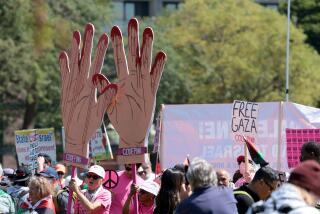War Protesters Are Taking to Information Superhighway
- Share via
WASHINGTON — Opponents of a U.S. invasion of Iraq flooded the nation’s capital with phone calls, e-mails and faxes Wednesday in an organized protest with a technological twist.
Organizers of the “virtual march on Washington” said that Senate offices and the White House were deluged with more than 1 million calls and faxes.
“We are getting slammed by the virtual marchers,” said an aide to Sen. Zell Miller (D-Ga.), who supports President Bush in the use of force, if necessary, to disarm the government of Saddam Hussein, with or without U.N. approval.
Many callers to the Capitol were greeted by a recorded message saying “all circuits are busy.”
Sen. Dianne Feinstein (D-Calif.), whose office received more than 3,000 phone calls -- only 12 of which supported Bush -- doubled to six the number of aides answering calls.
The weary aides answered one call after another, without respite, keeping count on a tally sheet and courteously telling callers, “Thank you for calling. I’ll pass on the message to the senator.” Feinstein supports further U.N. inspections and authorization by the U.N. Security Council for the use of force against Iraq.
Callers to Senate offices left messages such as “Don’t rush to war” and “Work with the U.N.”
Although aides said the volume of calls was less than that received during President Clinton’s impeachment, the sound of ringing from Senate offices filled the corridors all day.
Thomas H. Andrews, who organized the protest for Win Without War, a coalition of groups including the NAACP, the Sierra Club and the National Council of Churches, said the outpouring of public support in favor of additional inspections and against an invasion of Iraq “got through loud and clear.”
“Our support is clearly growing as the American people begin to reject the administration’s arguments for war,” said Andrews, a former Democratic congressman from Maine.
The campaign was organized through the Web site www.moveon.org. The Sierra Club, for example, sent out an alert to members to join in a peace march “without ever leaving your home.”
“Senators pay attention when their phones and fax machines light up -- and stay lit up,” the group’s e-mail said.
But it wasn’t clear that the calls weakened congressional support for Bush’s stand.
A spokesman for Sen. Peter Fitzgerald (R-Ill.), who received more than 100 calls in an hour, said, “The senator is confident that all Americans will support our troops if they are ultimately deployed.”
Brian Stoller said his boss believes that “military force must be a last resort, but that it must be a resort if, as it appears, all other efforts to compel Iraqi disarmament prove fruitless.”
Andrews insisted that the protest would have an impact.
“Politicians are famous for saying, ‘This doesn’t affect them,’ ” he said. “Richard Nixon said that throughout the Vietnam War. It was after he left office that he was frank in saying just how much the antiwar demonstrations did affect him.”
Calls to the White House were routed to the “comment line,” where callers can leave a recorded message that is later transcribed. Officials could not provide a count.
“The president respects the rights of individuals to express their views,” said White House spokeswoman Claire Buchan. “That is not a right that the people of Iraq have.”
More to Read
Sign up for Essential California
The most important California stories and recommendations in your inbox every morning.
You may occasionally receive promotional content from the Los Angeles Times.











